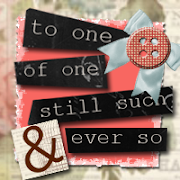This month is Shakespeare's month for
the Classics Club Project. I just have to be a part of it. And yet,
although I have mustered all my courage and determination to at last
read Macbeth, I still couldn't do it. Not this month.
This month is a month of journey, of
new things, of work, and of ideas. For me, it's also a month of
melancholy and poetry, especially because I have been very much in
love lately with Keats' Ode to a Nightingale – a brilliant, sweet,
and sad poem. I couldn't bring myself to read anything Shakespearian
or his contemporaries until this morning.
Having in my hand a compilation of
Christopher Marlowe's plays, the library's, which I haven't returned
for more than a month now (and I can't even think about the penalty
for it. I will return it as soon as possible), I just felt that this
book must not lie here in vain. I must read it. And I knew I must
read it before the end of the month. So I just woke up this morning
with the book beside my pillow and started to read The Jew of
Malta.
One
more reason to choose The Jew of Malta instead
of other plays on the list – it inspired Shakespeare's Merchant,
one of my favourites among the canon. I didn't expect it to be so
different.
Machevill
opens the play with a prologue, introducing to the audience the Jew –
Barabas. Barabas, just like Shakespeare's Shylock was just a merchant
Jew, who got rich through his trade. He had some ships trading
precious merchandise – pearls, silk, and numerous types of gems. He
was the richest man in town. But everything changed overnight.
The
Governor of Malta was to give a great sum of money to the son of
Ottoman Emperor. To provide such massive amount of money he forced
the Jews – all Jews – to give up half of their riches, or else
convert to Christianity. If they would not accept either, all their
riches would automatically go to the city's treasury. As
the Governor was too quick in his judgement, Barabas was too late to
realise his unfortunate position. He lost all he had. His riches went
to the city's, and his house was transformed into a nunnery.
Meanwhile,
the Jew had a daughter. While he vowed that he loved her as much as
Agamemnon loved Iphigenia, he did exactly what Agamemnon did to his
daughter – used her to his own advantage. Firstly
Abigail, the girl, was asked to enter the nunnery and saved her
father's left riches, hidden inside the house. Next, the
girl was forced to entertain
the best friend of the man she loved, resulting in a fatal duel
between the two. When she realised what had happened, she re-entered
the nunnery, vowing to be there for the rest of her life, punishing
herself for the death of Mathias, her beloved.
Barabas
was not happy. He would rather see the girl burn in fire than become
a Christian. So he, with the help of his purchased slave, poisoned
the whole house and all the nuns in it, including his daughter.
Before she died, she confessed everything to a friar, adding that she
wanted to see her father become a Christian. Upon learning that this
friar knew everything, instead of becoming a Christian, Barabas
killed him.
That's
not all. The slave-turned-heir of his started to threaten him to get
his money. When he was drunk, he spilled all his master's secrets to
a courtesan and her friend. They ended up poisoned – but not before
telling the Governor everything there was to know. Barabas was
sentenced to death and thrown outside the city.
It was
not easy to kill him, apparently. He survived and made an alliance
with the Turk Prince who was about to war against Malta. He betrayed
the city and was appointed Governor. His reign was not long. Trying
to play both sides, he was tricked by the old Governor and died
alone. The old Governor took the Turk Prince captive and restored
peace to the city.
The
end.
It was
not a pleasant story. Just like what Shakespeare did to Richard III,
I feel that Marlowe extremely demonized his Jew, Barabas. While the
Christian Governor was not free from sin either, neither was the Turk
Prince, the Jew got all the blame for what happened, and we don't
have a chance to see what's wrong with him – what was it all about.
True he talked of revenge, but, revenge
for what? Revenge to whom? Whose fault? He seemed to be angry to
everybody and hurt every single one he'd want to blame.
The
“contest of crime” that he had with his slave Ithamore is also
extraordinary. Both bragged for being the worst person between the
two. His first advice to his slave reflected his way of life. “First
be thou void of these affections:/Compassion, love vain hope, and
heartless fear;/Be mov'd at nothing, see thou pity none,/But to
thyself smile when the Christians moan.”
One
other thing to note: This play to me feels like the triumph of the
Christians over the Moslem world and over the Jews. However, the
fight was not won fairly. The Governor tricked the Jew to get his
riches, therefore he was the main cause of all things that happened
to the city in Barabas' revenge process, and later on tricked Barabas
into his death. The Governor at first agreed to give the Turks a sum
of money, he changed the deal later on, believing that Bosco and the
King of Spain would help him.
Taking
Marlowe's belief into consideration, it's very likely that the play
really describes religion as a 'childish toy,' something that people
play for their own advantage. Just as the Governor used Barabas'
status as a Jew to justify taking all his riches, Barabas used her
daughter as a nun to regain riches. The praise that the Governor gave
“Neither to Fate nor Fortune, but to Heaven” ends the play in
rather a sarcastic tone after all.




















